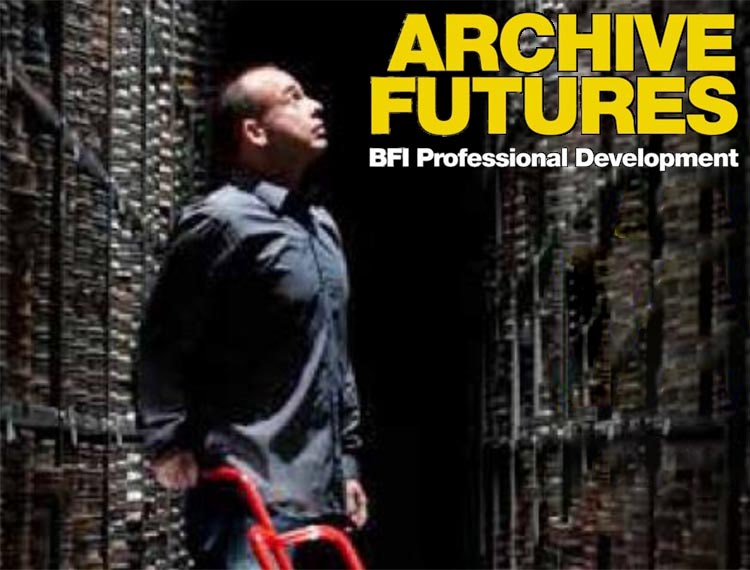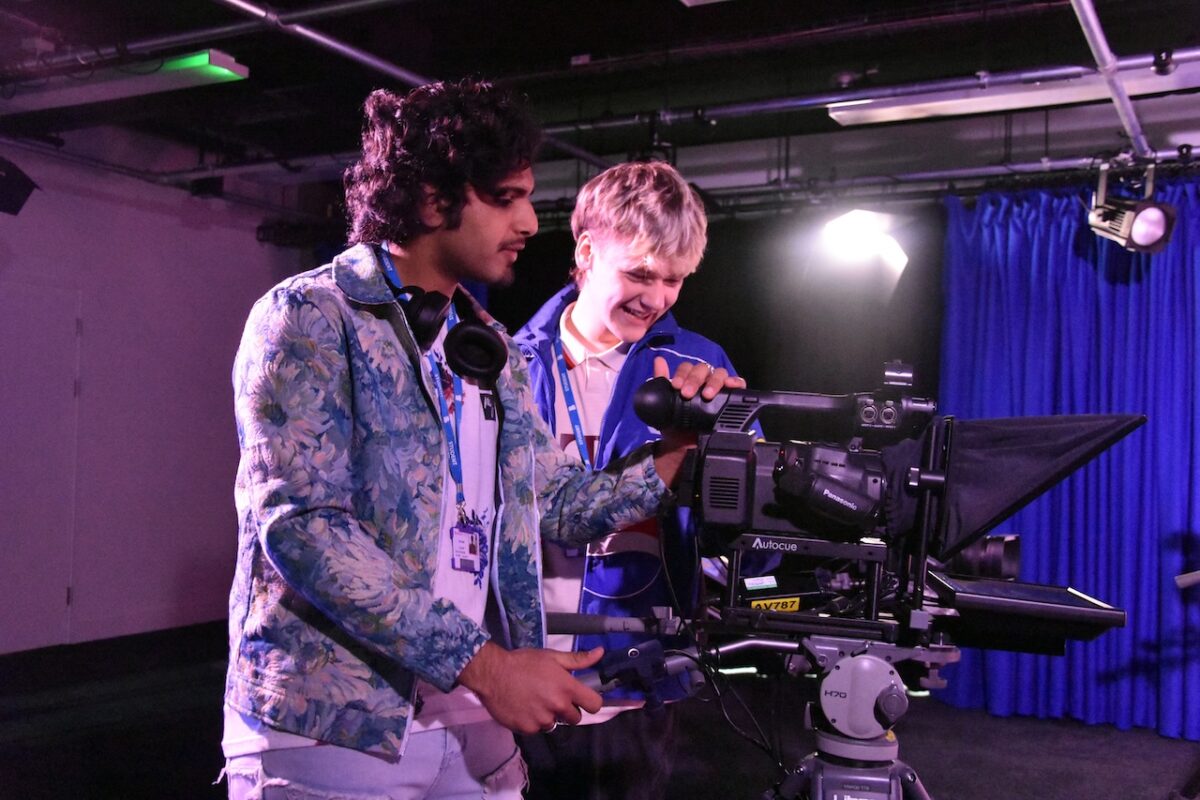BFI NATIONAL ARCHIVE OPENS ITS DOORS TO ARCHIVISTS AROUND THE WORLD WITH SPECIALIST TRAINING PROGRAMME

The BFI National Archive, one of the world’s largest and most significant archives of film and television and at the forefront of latest techniques in preservation and digitisation, announces a new development programme Archive Futures. This unique programme gives archive professionals from around the world the opportunity to learn from the BFI’s internationally renowned technical experts and curators. The course runs from 22-24 February, 2017 at BFI Southbank and the BFI National Archive, Berkhamsted. Specialist film restoration and archival R3storeStudios.com are kindly sponsoring this unique 3-day training programme.
The public’s appetite for archive content is clear from the huge critical acclaim for BFI National Archive restorations such as The Great White Silence and The Epic of Everest and the recently released Napoleon. The BFI’s Britain on Film project with 7,000 newly digitised titles released online has already been enjoyed by over 20 million people across the UK. However, in order to ensure the continuing preservation and accessibility of our film and television heritage we must develop new skills and technologies so that our rich screen history can be enjoyed for generations to come.
he challenges of preserving and accessing film, television and video in all their historic formats are something that all archives have in common. The scale of the BFI National Archive’s collections have demanded radical solutions and clear models of practice which can be copied and adapted for use in any collection, large or small by other archive collections.
Archive Futures is aimed at archive and collections specialists and managers who want to share their own experiences and learn from professionals at the cutting edge of archive practice as we enter a new digital age. The BFI has been at the forefront in creating systems to bring archive working practices up to date and has pioneered data capture and cataloguing systems which have been adopted across the world.
This course is unique in offering a wide range of experience and expertise from the working practitioners at one of the world’s most significant and busiest archives. The course is led by key staff from the BFI National Archive: Charles Fairall, Head of Conservation and Robin Baker, Head Curator. They will be joined by Ron Martin, Head of Collections Management; Helen Edmunds, Collections Manager; Kieron Webb, Film Conservation Manager; and Stephen McConnachie, Head of Date Collections & Information.
The BFI National Archive was founded in 1935 and was a founding partner of the Federation International des Archives du Film (FIAF). Recent developments in creating new standards for cataloguing and creating digital records for film and associated collections have been adopted by many other archives and libraries.
Archive Futures was successfully piloted in early 2016 and previous participants were welcomed from China Film Archive, Film Archives of Estonia, Museum of Film Argentina, Museum of Cinema Portugal, National Library Board Singapore, National Film Centre Tokyo, National Film Centre of Ukraine, Riofilme Brazil and Thai Film Archive. 81% of delegates rated the course Excellent and 94% rated the course relevance to their work as Excellent.
Charles Fairall, Head of Conservation, BFI National Archive said, “The BFI is passionate about sharing our knowledge with archivists around the world and Archive Futures will provide essential learning and knowledge about the latest techniques and innovations in professional film and television archiving for the 21st century. These skills are vital if we are to continue preserving, restoring and making our film and television history accessible for generations to come.”
Jo Griffin, Chief Operating Officer, R3store Studios said of the sponsorship, “We are very proud of our sponsorship of this valuable and important training programme provided by the BFI. Our involvement and support aims to encourage global content owners and nations to understand and leverage their own important film archive assets. Developing and growing skills and networks through world-leading archives and restoration specialists has so many possible benefits that it seems timely and important that we lend our specialist techniques and expertise to extend skills-sharing to preserve the world’s cultural and historical archive heritage. We’re all really looking forward to meeting the delegates in February.”
The course is limited to 20 participants and will take place in English over 3 days from 9am – 5.30pm, followed by evening social activity. The cost is £1,950. For bookings and all other information: archivefutures@bfi.org.uk
Press contacts
Brian Robinson, Communications Manager, Archive & Heritage, BFI, Tel +44 (0) 207 957 8940 brian.robinson@bfi.org.uk ( until 5th January 2017)
Elizabeth Dunk, Press Office Assistant, 020 7957 8986 elizabeth.dunk@bfi.org.uk
Judy Wells, Head of Press and PR, BFI, Tel +44 (0) 7957 8919 / 07984 180501 judy.wells@bfi.org.uk
About the BFI
The BFI is the lead organisation for film in the UK with the ambition to create a flourishing film environment in which innovation, opportunity and creativity can thrive by:
• Connecting audiences to the widest choice of British and World cinema
• Preserving and restoring the most significant film collection in the world for today and future generations
• Championing emerging and world class film makers in the UK – investing in creative, distinctive and entertaining work
• Promoting British film and talent to the world
• Growing the next generation of film makers and audiences
The BFI is a Government arm’s-length body and distributor of Lottery funds for film. The BFI serves a public role which covers the cultural, creative and economic aspects of film in the UK. It delivers this role:
• As the UK-wide organisation for film, a charity core funded by Government
• By providing Lottery and Government funds for film across the UK
• By working with partners to advance the position of film in the UK.
Founded in 1933, the BFI is a registered charity governed by Royal Charter.
The BFI Board of Governors is chaired by Josh Berger.
About the BFI National Archive
The BFI National Archive was founded in 1935 and has grown to become the one of the largest and most important collections of film and television in the world with over 180,000 films and 750,000 television programmes. For over 80 years the BFI has been an international leader in film preservation and guardian of Britain’s unparalleled film and TV heritage. The BFI is an innovator in presenting films to audiences in new and dynamic ways, from cinemas to film festivals, outdoor events to online video-on-demand. At the heart of all its activities is the BFI’s central aim to ensure that everyone in the UK has access to the widest possible range of film and their own film heritage.
That heritage includes all time great British directors Alfred Hitchcock, David Lean and Powell and Pressburger; and the rich vein of documentary filmmaking, in which Britain led the world, including the lyrical work of Humphrey Jennings. The archive also boasts a significant collection of filmmakers’ papers as well as extensive stills, posters and production and costume designs along with original scripts, press books and related ephemera.
Expert teams undertake the time-consuming and complex task of restoring films at the BFI John Paul Getty Jr Conservation Centre in Hertfordshire. The BFI’s most precious film materials are kept in optimum conditions in the world-leading Master Film Store in Warwickshire.
About R3:store Studios
R3store Studio’s work enhances, invigorates and preserves historical archive footage. With techniques that combine leading edge technical resources alongside the gentle reverence of experienced film craftsmen, every piece of film is fastidiously restored to emphasize the contours and details of its original message. Working with some of the world’s leading film archives, R3store’s processes are more than simply capturing and digitising moving images. R3store breathes new life into footage once considered almost too valuable to view. Exploring the nature and relevancy of the content is crucial to the work the London based does, dictating the fine use of colour grading and restorative techniques. The final results are delivered to the collection’s curators in digital formats, granting them the ability to broadcast the glory of their film archives to a new audience without fear of damaging or degrading their original resources. The company offer all stages including; film prep and ultrasonic film cleaning, grading & colouration and restoration of both picture and sound to stunning quality. Please get in touch if you have a film archival or restoration project in mind.
Call R3store Studios on 020 3871 5300 or email them at info@r3storestudios.com











Responses